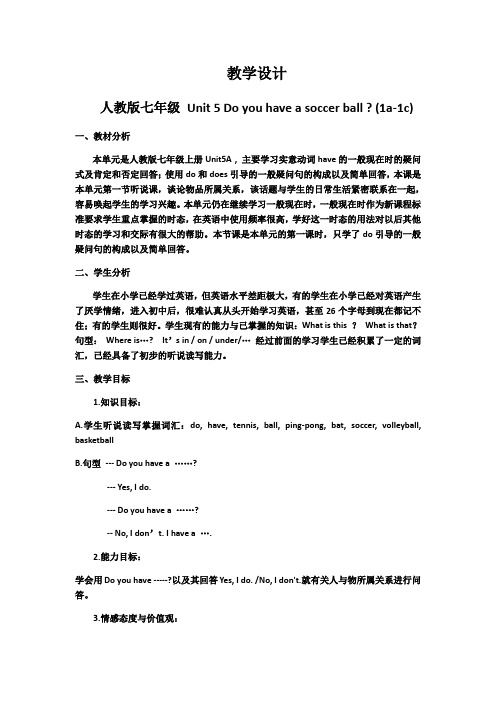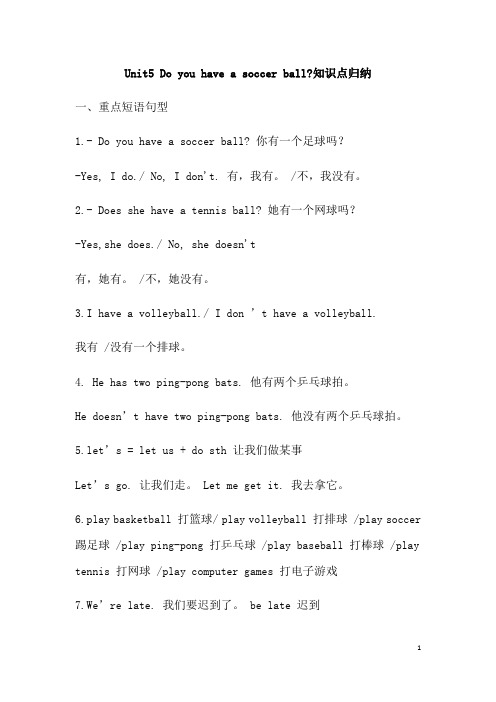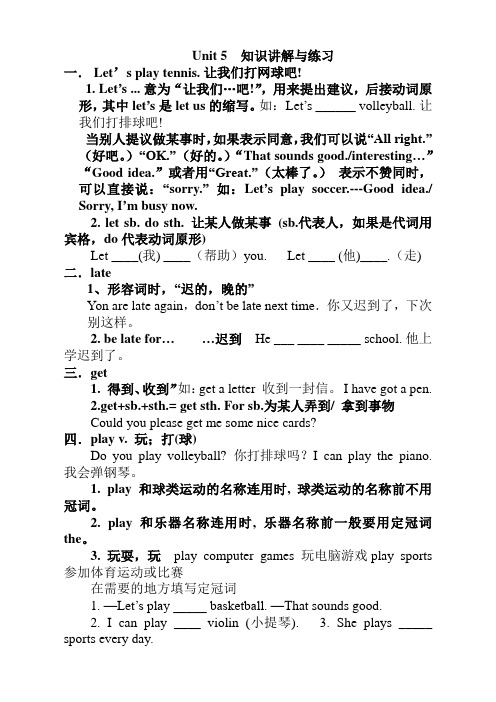人教七上英语:Unit 5 Do you have a soccer ball教案
人教版英语七上 U5 Do you have a soccer ball 讲义

Unit5 Do you have a soccer ball?一、重点词汇及拓展1. have v.(1) 有e.g. I have a pen. 我有一只钢笔。
(2) 吃;喝e.g. I have breakfast every day. 我每天吃早饭。
(3) 经历e.g. have a good time 玩得开心;过得愉快(4) 上课e.g. We have English lessons every day. 我们每天上英语课。
(5) 举办e.g. Mark has a party. 马克举办了一个派对。
(6) 得…病e.g. He has a cold and a headache. 他感冒和头疼。
2. let v.允许;让let’s = let us 让我们let sb. do sth. 让某人做某事let sb. not do sth. 让某人不要做某事e.g. Let’s have a party tonight! 让我们今晚举办一个派对吧!make sb. do sth. 使某人做某事e.g. The movie makes me miss my mother. 这部电影使我怀念我的妈妈。
3. go v.去;走go to +地点去某地go to school 去学校go here/there/home 去这儿/去那/回家go shopping 去购物go swimming 去游泳go hiking 去远足go skating 去轮滑go boating 去划船4. lateadj. 迟的;晚的be late for school 上学迟到be late for class 上课迟到1be late for work 上班迟到adv. 迟地;晚地later adv. 后来;以后e.g. Three days later, he found his father. (句中有段时间+later,句子用一般过去时)三天后,他找到了他的爸爸。
Unit 5 Do you have a soccer ball 知识点归纳-七年级上册英语

人教版新目标七上英语单元知识点归纳Unit 5 Do you have a soccer ball?重点词汇tennis/'tenis/ n. 网球bat /bæt/ n. 球棒;球拍soccer ball (英式)足球volleyball/'vɔlibɔ:l/ n. 排球basketball/'ba:skitbɔ:l/ n. 篮球late/leit/ adj. 迟到great/greit/ adj. 美妙的;伟大的play/plei/ v. 参加(比赛或运动);玩耍sound/saund/ v. 听起来好像interesting/'intrəstiŋ/ adj. 有趣的boring/'bɔ:riŋ/ adj. 没趣的;令人厌倦的fun/fʌn/ adj. 有趣的;使人快乐的n.乐趣;快乐difficult/'difikəlt/ adj. 困难的relaxing/ri'læksiŋ/ adj. 轻松的;令人放松的watch/wɔtʃ/ v. 注视;观看same/seim/ adj. 相同的easy/'i:zi/ adj. 容易的;不费力的class/kla:s/ n. 班级;课classmate/'kla:smeit/ n. 同班同学重点短语:a tennis bat 一个网球拍play basketball 打篮球baseball bat 棒球棒have a soccer ball 有一个足球play soccer 踢足球with our friends 和我们的朋友一起have a ping-pong ball 有一个乒乓球play ping-pong 打乒乓球have a volleyball 有一个排球play volleyball 打排球at school 在校,上学play sports 做运动watch TV 看电视in my bag 在我的包里be late 迟到on TV 电视上必背典句:1. Do you have a soccer ball? 你有一个足球吗?2. Does he/she have a ping-pong ball?他/她有一个乒乓球吗?3. Do you play sports with your classmates? 你和你的同学一起做运动吗?4. Let’s play soccer together! 我们一起踢足球吧!5. How many sports do you like?你喜欢多少种运动?6. I like playing soccer and basketball. 我喜欢踢足球和打篮球。
英语人教版七年级上册Unit5 Do you have a soccer bal

教学设计人教版七年级Unit 5 Do you have a soccer ball ? (1a-1c) 一、教材分析本单元是人教版七年级上册Unit5A , 主要学习实意动词have的一般现在时的疑问式及肯定和否定回答;使用do和does引导的一般疑问句的构成以及简单回答,本课是本单元第一节听说课,谈论物品所属关系,该话题与学生的日常生活紧密联系在一起,容易唤起学生的学习兴趣。
本单元仍在继续学习一般现在时,一般现在时作为新课程标准要求学生重点掌握的时态,在英语中使用频率很高,学好这一时态的用法对以后其他时态的学习和交际有很大的帮助。
本节课是本单元的第一课时,只学了do引导的一般疑问句的构成以及简单回答。
二、学生分析学生在小学已经学过英语,但英语水平差距极大,有的学生在小学已经对英语产生了厌学情绪,进入初中后,很难认真从头开始学习英语,甚至26个字母到现在都记不住;有的学生则很好。
学生现有的能力与已掌握的知识:What is this ?What is that?句型:Where is…? It’s in / on / under/…经过前面的学习学生已经积累了一定的词汇,已经具备了初步的听说读写能力。
三、教学目标1.知识目标:A.学生听说读写掌握词汇:do, have, tennis, ball, ping-pong, bat, soccer, volleyball, basketballB.句型--- Do you have a ……?--- Yes, I do.--- Do you have a ……?-- No, I don’t. I have a ….2.能力目标:学会用Do you have -----?以及其回答Yes, I do. /No, I don't.就有关人与物所属关系进行问答。
3.情感态度与价值观:A热爱体育活动,培养适合自己的体育爱好,锻炼身体。
B.在小组活动中,培养学生团结协作精神。
人教版七年级上Unit5 Do you have a soccer ball知识点归纳

Unit5 Do you have a soccer ball?知识点归纳一、重点短语句型1.- Do you have a soccer ball? 你有一个足球吗?-Yes, I do./ No, I don't. 有,我有。
/不,我没有。
2.- Does she have a tennis ball? 她有一个网球吗?-Yes,she does./ No, she doesn't有,她有。
/不,她没有。
3.I have a volleyball./ I don ’t have a volleyball.我有 /没有一个排球。
4. He has two ping-pong bats. 他有两个乒乓球拍。
He doesn’t have two ping-pong bats. 他没有两个乒乓球拍。
5.let’s = let us + do sth 让我们做某事Let’s go. 让我们走。
Let me get it. 我去拿它。
6.play basketball 打篮球/ play volleyball 打排球 /play soccer 踢足球 /play ping-pong 打乒乓球 /play baseball 打棒球 /play tennis 打网球 /play computer games 打电子游戏7.We’re late. 我们要迟到了。
be late 迟到8.That sounds good. 那听起来很不错。
That sounds interesting/fun/relaxing/boring/difficult. 那听起来很有趣 /放松 /无聊 /困难。
9.watch TV 看电视10.play sports with our classmates 和我的同学做运动11.go to the same school 去同一间学校上学。
12.at school 在学校13.only watch them on TV 只在电视上看它们14.It ’s adj(形容词) for sb.对某人来时怎么样。
人教版英语七年级上册Unit-5--do-you-have-a-soccer-ball

人教版英语七年级上册Unit 5 Do you have a soccer ball?单元教材分析本单元主要学习动词have的一般现在时的用法;使用do和does引导的一般疑问句的构成以及简单回答。
本单元围绕“和朋友一起欢度时光”这一话题安排了三个任务:一是列举所学的运动项目,从中挑选出各自喜欢的体育项目,并说明原因,目的是巩固并新学一些体育项目的名词;二是让学生互相询问所爱好的运动,并根据情况发出邀请,学会用have对物品的所属进行提问与回答,掌握用do和does引导的一般疑问句的构成及使用,了解用Let’s 提建议的句型;三是写作,把任务一、二的完成情况写成日记,进一步复习、巩固所学的语言目标。
通过本单元的学习,学会用have对物品的所属进行提问与回答;学会用let’s…句型提建议;能够谈论自己喜欢哪些球类运动,不喜欢哪些球类运动及原因;能够谈论怎样和自己的朋友度过一段愉快的时光。
单元总体目标.1. 在询问对方是否有某物的对话中学会使用do和does引导的一般疑问句。
2. 学会使用描述性的形容词来评价事物。
3. 学会在对话中使用名词复数。
4. 学会用祈使句来向对方提出建议。
5. 学会用祈使句询问某人是否有某物。
6. 学会向他人提出建议的句子。
7. 学习了解一般现在时。
8. 在本单元中,通过阅读有关运动的文章和对话,使学生更加热爱体育活动并培养一种适合自己的体育爱好。
9.在小组活动中,培养学生团结协作精神。
单元重难点一览表本单元的主题是使用have对物品的所属进行提问及回答,以掌握行为动词在一般现在时中的构成和使用;同时引导学生使用所学的句型谈论自己在球类运动中的喜好。
行为动词在一般现在时的肯定句、否定句和一般疑问句中的构成和使用是初中英语教学中非常重要的内容,本单元知识的掌握程度将直接影响今后的英语学习。
学生在以前的学习中已经掌握了be动词在一般现在时中的构成和使用,在学生的头脑中也已经形成了一个模式,这种模式将直接影响学生对本单元知识内容的接受,所以教师在教学中一定要善于引导,以免学生养成不良习惯。
人教新目标七年级上册英语Unit 5 Do you have a soccer ball知识点汇总

人教新目标七年级上册英语Unit 5 Do you have a soccer ball?知识点汇总第一课时:Section A ---Grammar focus.一、重点词汇:1. have v. 有(用于第一人称(I,we),第二人称(you),以及第三人称复数(they或其他复数名词等);has用于第三人称单数(he,she,it或单数名词)。
如:I/ We/ You/ They/ The boys have an orange. 我有一个橘子。
He/ She / It/ Tom has a Chinese friend. 汤姆有一位中国朋友。
2. tennis n.网球3. volleyball n.排球4. basketball n. 篮球*5. ping-pong bat 乒乓球拍tennis bat 网球拍*6. play v. 名词为:player 指队员,play 后加球类、棋牌类。
E.g.: play soccer/ chess.*7.do v. 实意动词,又称行为动词,意为“做”,例如:do homework; 单三为does,do 又可作为助动词,帮助实意动词构成疑问句或否定句,主语第三人称单数时,用does.二、重点词组:1. play basketball / soccer / tennis / ping-pong 打篮球/ 踢足/ 网球/打乒乓球/打排球;常与play搭配的动词短语还有:play cards打牌play chess 下象棋,中间不加the;*而表示“弹钢琴、拉小提琴”等乐器前,一定要加上定冠词the,其结构为:play +the +乐器。
如:play the piano弹钢琴play the flute吹笛子play the violin拉小提琴;*play with “玩……”,如:The boys are playing with the ball.2. play computer games 玩电脑游戏*3. ping-pong bat 乒乓球拍tennis bat 网球拍三、重点句型及句子:Do you have a ping-pong bat? Yes, I do. / No, I don’t.这是一个一般现在时的一般疑问句,其肯定句为I have a ping-pong ball. 其中,have为实意动词,意为“有”。
人教版英语七年级上册 Unit 5 Do you have a soccer ball_

Period 1(SectionA1a-2c)
Sentences Sports things
Do you have a…?soccer ball ping-pong ball
Yes, I do. /No I don’t.basketball ping-pong bat
5. Let Ss do the pair work according to the chart.
4.Do the listening,writing and reading practice.
5.Make conversations in pairs.
Consolidation
1.Let Ss practice the conversation : Does he/she have a/an… ?.Yes,he/she does./No, he/she does’t.
2.Tell Ss. to do the groupwork.
1.Practice making
conversations :Doeshe/she
have a/an… ?Yes,he/she does./No, he/she does’t.
2.Do some exercises.
3.Ss.work in groups to talk about the ownership in the room.
设计主题
Unit 5 Do you have a soccer ball?
Period 1 Section A 1a-2c
1.教学
内容
1)Words & expressions: have, soccer ball, tennis, racket, tennis racket, ping–pong, volleyball, basketball, bat.
人教英语七上:Unit 5 Do you have a soccer ball 知识讲解与练习

Unit 5 知识讲解与练习一. Let’s play tennis. 让我们打网球吧!1. Let’s ... 意为“让我们…吧!”,用来提出建议,后接动词原形,其中let’s是 let us的缩写。
如: Let’s ______ volleyball. 让我们打排球吧!当别人提议做某事时,如果表示同意,我们可以说“All right.”(好吧。
)“OK.”(好的。
)“That sounds good./interesting…”“Good idea.”或者用“Great.”(太棒了。
)表示不赞同时,可以直接说:“sorry.”如:Let’s play soccer.---Good idea./ Sorry, I’m busy now.2. let sb. do sth. 让某人做某事(sb.代表人,如果是代词用宾格,do代表动词原形)Let ____(我) ____(帮助)you. Let ____ (他)____.(走) 二.late1、形容词时,“迟的,晚的”Yon are late again,don’t be late next time.你又迟到了,下次别这样。
2. be late for……迟到He ___ ____ _____ school. 他上学迟到了。
三.get1. 得到、收到”如:get a letter 收到一封信。
I have got a pen.2.get+sb.+sth.= get sth. For sb.为某人弄到/ 拿到事物Could you please get me some nice cards?四.play v. 玩;打(球)Do you play volleyball? 你打排球吗?I can play the piano. 我会弹钢琴。
1. play和球类运动的名称连用时, 球类运动的名称前不用冠词。
2. play和乐器名称连用时, 乐器名称前一般要用定冠词the。
- 1、下载文档前请自行甄别文档内容的完整性,平台不提供额外的编辑、内容补充、找答案等附加服务。
- 2、"仅部分预览"的文档,不可在线预览部分如存在完整性等问题,可反馈申请退款(可完整预览的文档不适用该条件!)。
- 3、如文档侵犯您的权益,请联系客服反馈,我们会尽快为您处理(人工客服工作时间:9:00-18:30)。
七年级英语(含教案和练习)Unit 5 Do you have a soccer ball一、学习目标:1. —Do you/ they have a soccer ball? —Yes, we/they do. /No, we/they don’t.2. Does she/he have a tennis racket? —Yes, she/he does. / No, she/he doesn’t.3. Let’s play volleyball!4. That sounds good/ interesting /fun/ boring!能力目标Talk about ownership. 谈论物主关系Make suggestions. 提出建议二、重点、难点重点1. 单词:play, sound , good, interesting, boring, difficult, fun, many, much, some2. 句型:Have … Let’s …难点一般现在时三、知能提升:(一)【重点单词】[单词学习]1. play [plei]与不同的词搭配表示不同的意思。
【用法1】vt. 玩(游戏);打(球);踢(球)【考点】与play 搭配使用时,球类名词前不加冠词【例句】play football 踢足球play basketball/ table tennis 打篮球/乒乓球【用法2】vt. 演奏【考点】与play 搭配使用时,乐器类名词前加定冠词the,表示“弹奏……”【例句】play the piano 弹钢琴play the guitar 弹吉他【考题链接】1. I like music. I play _____ violin after school.A. aB. anC. theD. /2. Let’s play ______ basketball together.A. aB. anC. theD. /答案:1. C 2. D解题思路:1. 与play 搭配使用时,乐器类名词前加定冠词the,表示“弹奏……”2. 与play 搭配使用时,球类名词前不加冠词。
2. sound [saund]【用法1】n. 声音,响声【例句】I like the sound of piano. 我喜欢钢琴的声音。
【用法2】v. 听起来连系动词,其后接名词,形容词或介词短语作表语。
【例句1】A: Let’s go to the park.B: That sounds interesting. 那听起来很有趣。
【解析】that指上句所提的建议,英语中指代前面所述的内容或事情,通常用that而不用this。
that属第三人称单数,故谓语动词sound后应加s。
【例句2】A: Do you like M ary’s story? 你喜欢玛丽(所讲)的故事吗?B: No, I don’t like it. The story sounds boring. 不,我不喜欢。
这个故事听起来很乏味。
【辨析】hear vt.听见指听到的结果I can’t hear your voice. 我听不见你的声音。
listen ['lisn]vi. 听指听的动作She's listening to the radio. 她在听广播。
【考题链接】A: I want to play volleyball with my friends. Do you want to come with me?B: Sure. That _____ interesting.A. soundB. soundsC. hearD. hears答案:B解题思路:根据语境含义:那听起来很有趣,可知选B项。
3. good, interesting, boring, difficult, fun【用法】这些形容词主要用在名词前作定语或在系动词后作表语。
She is a good teacher. 她是一个好老师。
This is an interesting book. 这是一本有趣的书。
Playing with Jack is very boring. 和杰克玩很无聊。
It’s a difficult question. I can’t answer it. 这是一个很难的问题。
我答不出来。
I had a fun weekend. 我过了一个有趣的周末。
这些形容词前还可以用副词来修饰。
This is a very interesting book. 这是一本很有趣的书。
I t’s too difficult. 它太难了。
【交际口语】That sounds+形容词。
“那听起来……”(用来表达个人观点)褒义的评价可选用:interesting, fun, relaxing, good, wonderful贬义的评价可选用:boring, terrible, bad【例句1】A: Let’s watch TV.B: That sounds bad. I want to play video games.【解析】sound在这里是连系动词,作“听起来……”讲,其后接一个形容词作表语。
【例句2】Your idea doesn’t sound good. 你的主意听起来好像不行。
【拓展】与sound类似的连系动词还有:look(看起来……,显得……),taste(尝起来……),smell(闻起来……)。
【例句】The song sounds beautiful. 这首歌听起来很优美。
That story sounds very interesting. 这个故事听起来很有趣。
Your watch looks very nice. 你的手表很好看。
【拓展】类似的表达法:look happy看上去很高兴sound like听起来像……look like看起来像……4. many, much, somemany adj. 大量的,许多的【用法】修饰可数名词。
【例句】I have many friends. 我有许多朋友。
much adj. 很多的,大量的【用法】修饰不可数名词。
【例句】There is much water in the bottle. 瓶子里有许多水。
some adj. 一些【用法】既可以修饰可数名词又可以修饰不可数名词【例句】She has some apples and I have some milk. 她有一些苹果,我有一些牛奶。
【考题链接】用many , much 填空A: Look! There are ______ toy cars in the shop.B: They are so cool. But I don’t have _____ money. We c an’t buy them.答案:many; much解题思路:toy car 玩具汽车——可数名词,可用many修饰。
money 钱——不可数名词,可用much修饰。
5. good, well 辨析good adj. 好的【用法】可用在名词前修饰名词,充当定语也可用于连系动词后,作表语。
【例句】Linda is a good girl. 琳达是个好女孩。
This restaurant is very good. 这家饭店很好。
well adv. 很好地;满意地【用法】作副词时,用来修饰形容词,副词或动词,在句子中作状语。
【例句】Do the boys eat well at school? 孩子们在学校吃得好吗?He plays soccer well. 他踢球踢得很好。
[即学即练]1. A: Do you want to play ________ after school?B: Yes, I do.A. basketballB. a basketballC. the basketballD. some basketballs2. I am hungry. I want to eat ______ rice.A. manyB. someC. anyD. a lot3. That _______ a good idea.A. listen toB. soundsC. hearD. listen答案:1. A. 2. B 3. B(二)【重点句型与表达】[句型学习]1. Do you have…?vt. 拥有,占有。
其主语可以指人,也可以指物,其第三人称单数形式为has。
【例句】I have a friend here. 我这儿有个朋友。
She has three dictionaries. 她有三本词典。
This coat has no pockets. 这件衣服没有口袋。
I have a book. It’s my book.You have a dog. It’s your dog.She has a pen. It’s her pen.He has a bike. It’s his bike.We have a TV. It’s our TV.They have a ball. It’s their b all.【考点】Jim and Tom have a computer. 吉姆和汤姆有一台电脑。
(两人共有,主语是复数)Jim has a computer. 吉姆有一台电脑。
【难点】have 有……there be 某地有某物、某人have强调的是拥有或占有,主语一般是名词或代词,其与主语是所属关系。
There is/ are ...表示某处有某物或某人,强调的是一种客观存在。
【例句】I have two brothers and one sister. 我有两个兄弟,一个姐姐。
My sister has two toys but I have one. 我妹妹有两个玩具,而我只有一个。
※有时there be结构和have可互换。
There are twenty classes in our school. =We have twenty classes in our school.我们学校有二十个班级。
【用法2】have vt. 吃,喝【例句】We have lunch at school. 我们在学校吃午饭。
He wants to have a cup of tea. 他想喝杯茶。
【考题链接】用there is , there are, have, has填空。
(1) Does she _____ a brother? No, she doesn’t.(2) Look! ______ a cat under the chair.(3) Mike _____ a ping-pong ball. But he doesn’t have a ping-pong bat.(4) ______ many interesting books at school.答案:1. have 2. There is 3. has 4. There are2. Let’s pla y ping-pong. 让我们打乒乓球吧。
